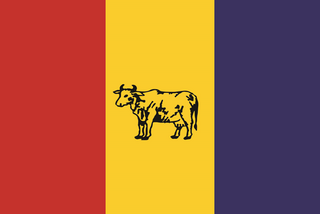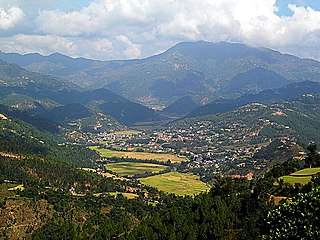Contents
This article relies largely or entirely on a single source .(January 2020) |
| |||||
| Decades: | |||||
|---|---|---|---|---|---|
| See also: | |||||
Events from the year 2004 in Nepal.
This article relies largely or entirely on a single source .(January 2020) |
| |||||
| Decades: | |||||
|---|---|---|---|---|---|
| See also: | |||||
Events from the year 2004 in Nepal.
| | This section needs expansion. You can help by adding to it. (September 2013) |

Nepal is a multi-ethnic, multiracial, multicultural, multi-religious, and multilingual country. The most spoken language is Nepali followed by several other ethnic languages.

The politics of Nepal functions within the framework of a parliamentary republic with a multi-party system. Executive power is exercised by the Prime Minister and their cabinet, while legislative power is vested in the Parliament.

The Kingdom of Nepal was a Hindu kingdom in South Asia, formed in 1768 by the expansion of the Gorkha Kingdom, which lasted until 2008 when the kingdom became the Federal Democratic Republic of Nepal. It was also known as the Gorkha Empire, or sometimes Asal Hindustan. Founded by King Prithvi Narayan Shah, a Gorkha monarch who claimed to be of Thakuri origin from chaubisi, it existed for 240 years until the abolition of the Nepalese monarchy in 2008. During this period, Nepal was formally under the rule of the Shah dynasty, which exercised varying degrees of power during the kingdom's existence.

Surya Bahadur Thapa was a Nepali politician and a five-time Prime Minister of Nepal. He served under three different kings in a political career lasting more than 50 years.

The Nepali Civil War was a protracted armed conflict that took place in the then Kingdom of Nepal from 1996 to 2006. It saw countrywide fighting between the Kingdom rulers and the Communist Party of Nepal (Maoist), with the latter making significant use of guerrilla warfare. The conflict began on 13 February 1996, when the CPN (Maoist) initiated an insurgency with the stated purpose of overthrowing the Nepali monarchy and establishing a people's republic; it ended with the signing of the Comprehensive Peace Accord on 21 November 2006.

Pushpa Kamal Dahal, alias Prachanda, is a Nepalese politician, currently serving as the Leader of the Opposition, since July 2024. He has served as the Prime Minister of Nepal on three separate occasions, from 2008 to 2009 as the first prime minister of the Federal Democratic Republic of Nepal, from 2016 to 2017, and again from 2022 to 2024.

The Communist Party of Nepal (Maoist Centre) (Nepali: नेपाल कम्युनिस्ट पार्टी (माओवादी केन्द्र)), abbreviated CPN (Maoist Centre) or CPN (MC), is the third largest political party in Nepal and a member party of Samajbadi Morcha. It was founded in 1994 after breaking away from the Communist Party of Nepal (Unity Centre). The party launched an armed struggle in 1996 against the Nepalese government. In 2006, the party formally joined mainstream politics after signing a peace agreement following the 2006 Nepalese revolution.

Sher Bahadur Deuba is a Nepali politician and former prime minister of Nepal. He has also been serving as the president of the Nepali Congress since 2016. Deuba has served five terms as prime minister and is the Member of Parliament for the parliamentary constituency of Dadeldhura 1.

The Rastriya Prajatantra Party is a constitutional monarchist and Hindu nationalist political party in Nepal.

Rastriya Janashakti Party was a liberal political party in Nepal, led by former Prime Minister Surya Bahadur Thapa. Thapa had split away from the Rastriya Prajatantra Party in November 2004. The party was registered with the Election Commission of Nepal in March 2005. The party merged into Rastriya Prajatantra Party on July 25, 2007.
Rastriya Prajatantra Party, Nepal is a Hindu right-wing, cultural conservative party. It previously existed as royalist political party in Nepal from 2006 to 2016. The party was formed as a splinter of Rastriya Prajatantra Party in 2006 and was later reunified in 2016. The party was reformed in 2022 by Kamal Thapa.

Sandhikharka Municipality is the headquarter of Arghakhanchi District which lies in Lumbini Province of Nepal. The former village development committee (VDC) was converted into a municipality on 18 May 2014 by merging the existing Sandhikharka, Wangla, Narapani, Khanchikot, Kimadada, Argha and Dibharna VDCs. It is located, in a valley surrounded by hills, in the western part of the capital, Kathmandu.

General Rookmangud Katawal is a former Nepalese Army general, who served as the Chief of Army Staff of the Nepal Army from 2006 to 2009. General Katawal has come across controversy after the then Prime Minister Pushpa Kamal Dahal unilaterally decided to sack him on May 3, 2009.

Kamal Thapa is a Nepalese politician belonging to Rastriya Prajatantra Party Nepal.
Events from the year 2003 in Nepal.
Events from the year 2002 in Nepal.

General elections were held in Nepal in two phases on 26 November and 7 December 2017 to elect the 275 members of the fifth House of Representatives, the lower house of the Federal Parliament of Nepal.

Satchit Shamsher Jung Bahadur Rana was the 34th Chief of Army Staff of the Royal Nepalese Army. He was a member of the Rana Dynasty of Nepal.

About 2,500 Maoist guerillas perpetrated a massive attack against the Nepal army in Mangalsen and Sanphebagar in Achham district on 16 February 2002 killing 57 soldiers, 77 policemen and five civilians. Several government buildings were put on fire and an airport at Sanphebagar was destroyed. The incident is considered the single most damaging strike by the rebels during the Nepalese Civil War.